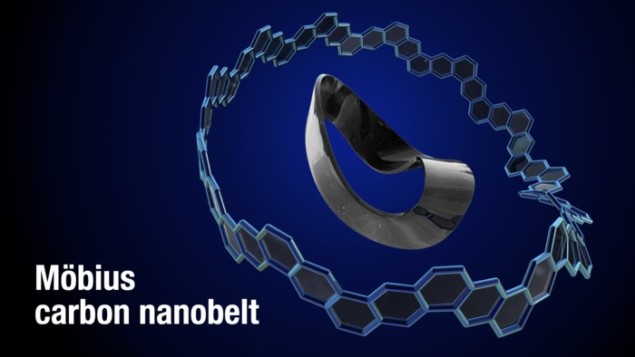
In 2017, Kenichiro Itami and colleagues made the first carbon nanobelts, which can be as little as three atoms thick. Based at Nagoya University in Japan, Itami’s team has managed to tweak the topology of their nanobelts to create Möbius carbon nanobelts (see figure). Making the nanobelts was not an easy task and took 14 chemical reaction steps. They confirmed the Möbius structure using a chiral separation technique and circular dichroism spectroscopy.
It looks like Itami and colleagues created their Möbius nanobelts for the sheer joy of being the first to do so, which is wonderful. Although they do point out that newly discovered forms of carbon have in the past opened doors to new science and technology. They also believe that the techniques they developed to create Möbius carbon nanobelts could be used to make other interesting and useful carbon nanostructures. They describe their work in an open access paper in Nature Synthesis.
Described as out of this world, Dark Matter Quantum Lager is the latest tipple from Canada’s Wellington Brewery. “Of course, we used Comet and Galaxy hops in this refreshingly crisp lager, to give the beer a zesty grapefruit and tangerine boost,” says the website of the brewery, which is in Guelph, Ontario. Keeping with the extra-terrestrial theme, meteorites from Namibia are added during the boil portion of the beermaking process.
Food-grade glitter
Some cans of the lager contain “food-grade glitter” and anyone who cracks one of these open can claim a prize from the brewery (although there is no mention of what the prize is). But the real winner from the launch of this beer is Royal City Science, which will receive 50 cents for every can of Dark Matter Quantum Lager sold. The Guelph-based organization describes itself as “a hub for informal science, technology, engineering, and mathematics (STEM) education to ignite curiosity, build confidence, and inspire the inner scientist in us all”.
Earlier this week, the brewery and Royal City Science hosted the “Physics of Fizz” public event with University of Guelph physicist Joanne O’Meara and brewer Mitch Marquis. If you happen to be in Southern Ontario, there are more events planned at Guelph breweries and pubs in May and June.



